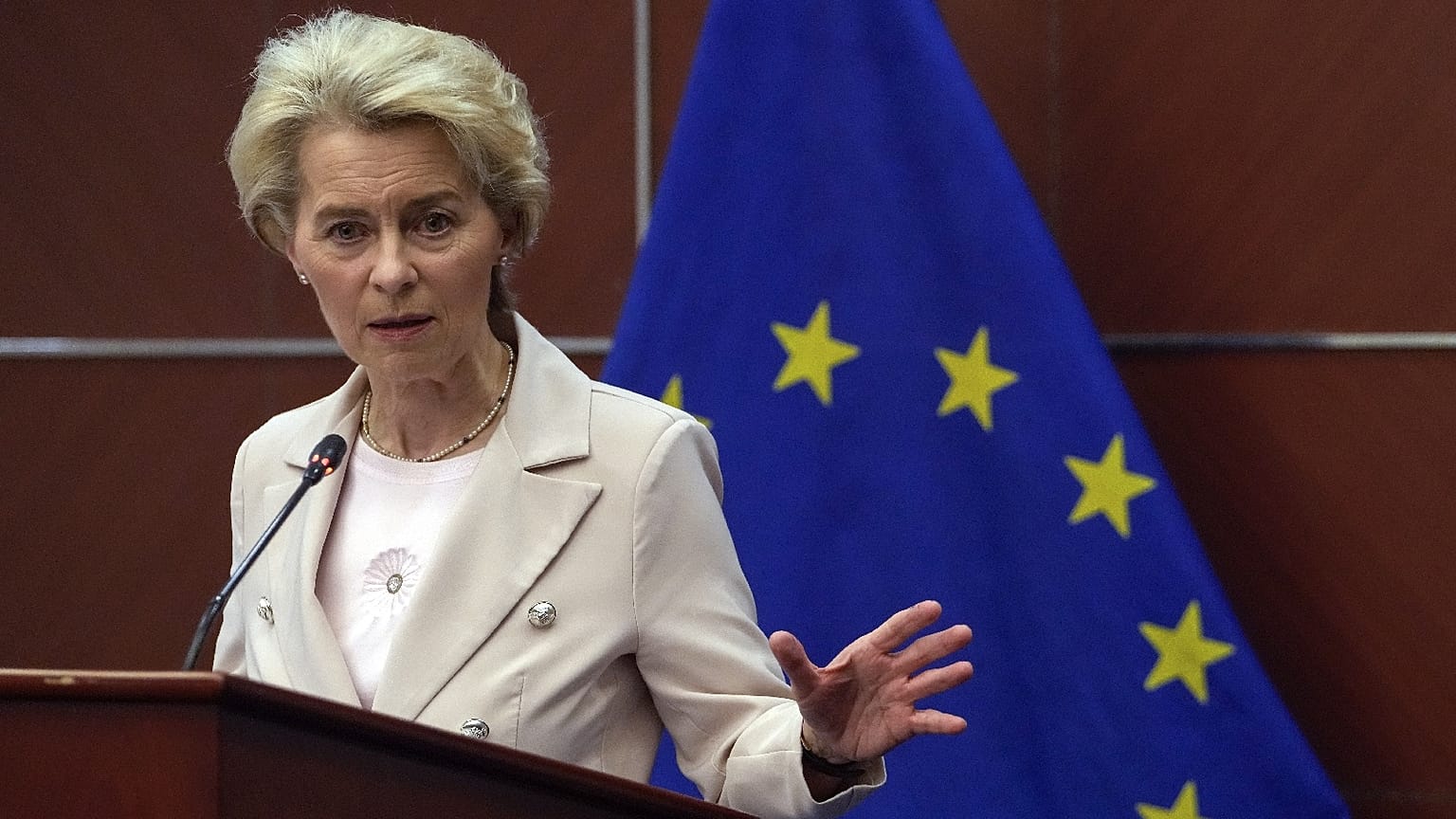In a statement to Commission chief Ursula von der Leyen, the NGOs warn that such legislation could hurt the EU's credibility to defend human rights abroad and embolden repressive leaders.
A planned European Union directive to create a register for foreign-funded organisations could have "unintended consequences" and limit the bloc's ability to support human rights defenders globally, scores of NGOs have warned in a joint statement to the European Commission.
 ADVERTISEMENT
ADVERTISEMENT
 ADVERTISEMENT
ADVERTISEMENT
Some 230 civil society organisations including Transparency International EU, Human Rights Watch and Amnesty International signed the statement sent on Wednesday to European Commission President Ursula von der Leyen in which they lambasted the plans for a Foreign Interference Law.
The law is to be part of an upcoming Defence of Democracy package announced by von der Leyen during her State of the Union address to the EU Parliament in September. The bloc's executive has not yet released its proposal for the law but has reached out to civil society organisations in recent months with a call for evidence.
According to NGOs contacted by the EU, the Commission argues that a new legal instrument is needed "to introduce common transparency and accountability standards for interest representation services paid for or directed from outside the EU, to contribute to the proper functioning of the internal market, and to protect the EU democratic sphere from covert outside interference".
'Incompatible with EU law'
These NGOs warn however that it could embolden repressive leaders worldwide and undercut the EU's credibility to speak out about restrictive laws in third countries.
They say, for instance, that such laws already rolled out in other countries have significantly curtailed the space for independent civil society and "been deployed as a tool to silence critical voices."
ILGA-Europe, an advocacy group promoting the interests of lesbian, gay, bisexual, trans and intersex people at the European level, said that "considering the important rules [for NGOs in the EU] in place already, the added value of an EU directive is very questionable."
The NGO's advocacy director, Katrin Hugendubel, also said that it likely "would play into the hands of those who want to use such laws to restrict access to funding for civil society organisations, as they have already done in the past."
"No matter how good the intention of the European Commission is, this proposal will be abused to justify such laws and undermine the credibility of the EU, internally and externally, in standing against such restrictions on access to funding," she added.
Nick Aiossa, Deputy Director and Head of Policy & Advocacy at Transparency International EU, also expressed concerns, saying in a that "there are reasons why the Commission has criticised foreign agent acts abroad and why they took Hungary to court over a similar domestic law".
"It is simply reckless the Commission refuses to do their homework and fully assess the real risks this type of legislation poses to civil society and journalists," he added.
Hungary's introduction of a foreign interference law in 2017 requiring organisations that receive at least 7.2 million forints (€19,000) annually from foreign sources to register as such with the court and to produce an annual report on their foreign funding prompted the Commission to swiftly start an infringement procedure against the country.
First Vice-President Frans Timmermans said at the time that the law did not comply with EU law, which the Court of Justice of the European Union confirmed in a June 2020 ruling.
More recently, plans by the government in Georgia to introduce such a "foreign influence" law were derailed in March after it sparked days of widespread protests across the country.
The law — modelled on a Russian version and which would have required any organisation that receives more than 20% of their funding from overseas to register as a "foreign agent" or face substantial fines — was denounced as a "very bad development for Georgia and its people" by the EU's top diplomat, Josep Borrell.
In a statement issued after it passed its first reading in the Georgian parliament, the High Representative said the law as drafted could have a "chilling effect on civil society and media organisations", that it was "incompatible with EU values and standards" and could thus lead to "serious repercussions" for EU-Georgia relations.
'We should not be naïve'
A spokesperson for the Commission rejected the accusations in a statement to Euronews, saying the planned law aims to protect "our democracies by imposing transparency obligations on activities seeking to impact public decision-making and the democratic debate in the EU caried out by entities funded by or with links to third countries."
"Looking at the actions by the Kremlin and other third-country actors, we should not be naïve. It is high time to bring covert foreign influence and shady funding to light," Christian Wigand added.
He also argued that "the upcoming proposal is not about curtailing activities, but is exclusively about common transparency standards for interest representation services" and that the entire package "will in fact also aim at promoting broad and meaningful participation of civil society and citizens, for a more resilient democratic space."
In their statement to von der Leyen, the NGOs called on the European Commission to clearly outline the legal case for this law, saying the call for evidence issued "fails to identify the specific need that new legislation would address and why an EU directive is a necessary or appropriate instrument."
They also demanded it carries out an impact assessment before they release any proposal on an EU foreign interference law. These assessments are required before the Commission can put out any legislation expected to have significant economic, social or environmental impacts.
This was also raised by German MEP Sergey Lagodinsky (Greens/EFA) last month during a hearing with Values and Transparency Commissioner Věra Jourová. She said then that no impact assessment had been made because "we are in a hurry", citing instead "different sources of information" and a study with data "we can reliably work with."
"But honestly, there is not sufficient data to disclose, at this moment, how big the problem [of third country influence on EU NGOs] is. We just know that the problem is serious and that we should stop being naive and we should require increased transparency, " she added.














